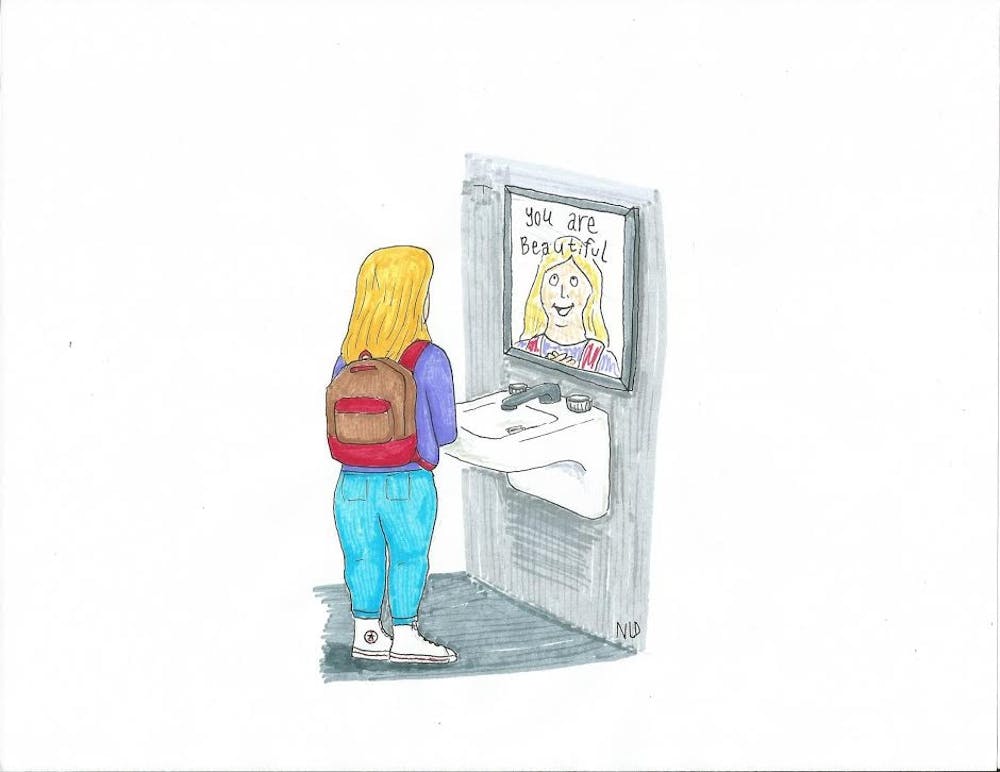A student inspects their reflection while they lift a 40-pound dumbbell because they’re self conscious of their thin arms. Someone else pulls nervously at the hem of their shorts as they leave the library because they worry that people are looking at the cellulite on the back of their thighs. Yet another student bites their nails as they recall every word they stumbled over in the presentation they just gave.
We’re all aware of how we appear to the people around us. We all think about our appearance in some way — whether it’s the physical way we present ourselves, or the intellectual or emotional way we come across.
With the amount of time we spend at the gym, in front of the mirror, at the hair salon or at clothing stores, you’d think we control our appearances enough to be satisfied with the way we look.
But apparently not, because according to “Reflections on Body Image,” a report released in 2012 by the UK’s All Party Parliamentary Group on Body Image, 60 percent of adults are ashamed of the way they look.
And according to research conducted by Dove, only four percent of women (surveyed from around the world) consider themselves “beautiful.”
This is even more important considering where we are in our lives. College is such an important time: It’s a formative four years where we learn a lot about the world around us and the world within us.
College aged men and women are in the prime time for experiencing negative body image and self esteem issues. According to the National Association of Anorexia Nervosa and Associated Disorders, “95 percent of people with eating disorders are between the ages of 12 and 25.”
Clearly it’s normal to have insecurities about the way we come across to people. But that doesn’t mean it’s something we should passively perpetuate — and it’s certainly not something we should actively encourage.
Youtube vlogger Nicole Arbour, known for her caustic, unapologetic critiques, recently posted a video claiming that fat-shaming does not exist. Her video went viral, sparking fiery responses across many social media platforms.
Her claim that fat-shaming doesn’t exist invalidated the experiences of men and women around the world who have experienced the pain and shame of being bullied because of their size.
A recent study conducted out of Ireland’s Temple Street Children’s University Hospital found that seven out of 10 children at the child obesity clinic reported being bullied because of their size, with one-tenth reporting self-harm, depression and anxiety disorders as a result.
Shaming someone because of their size has lasting effects on a person’s life — on their mental, emotional and physical well-being. And it’s sad that some people question the validity of peoples’ painful experiences. But that just means we have to work that much harder to foster positive body image and self esteem whenever we can.
Encouraging body positivity can take many forms.
You can show your support on social media: Write a positive statement about yourself or someone you know and then use hashtags like #bodypositive, #losehatenotweight or #bodylove.
You can leave positive notes in public places. Writing “You are beautiful” or “You are enough” on a sticky note and hanging it in your bathroom or in The Commons takes a little time, but nothing you can’t do in between buying a pumpkin spice latte and going to O Chem. Or if you’re especially outgoing, vocalize your affirmations. Instead of leaving a note, tell the guy handing you your latte that you like his smile. A little (genuine) compliment can make a person’s day.
You can even show yourself some love: List 10 things you like about yourself, or wear an outfit that accentuates your favorite feature. If you’re feeling especially ambitious, try journalling about the part of yourself you’re most self-conscious about — but write about it as if it was your favorite part.
There are times when it’s incredibly difficult to be body positive. Our culture doesn’t make it easy to love the skin we’re in. But it’s so important that we encourage and support body positivity in ourselves and others. We need to take care of each other. We need to take care of our own bodies. And we need to create an environment where people can express their insecurities, but where they’re also encouraged to love themselves unconditionally. We need to help each other love ourselves unconditionally.








